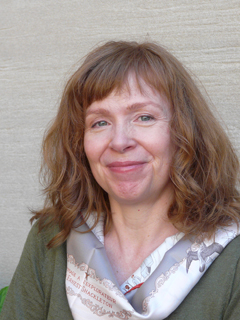
Professor Mary C. Fuller
Head of Literature
Mary Fuller talks about sensing with and without words.
In an aikido studio, two people stand facing each other. One grabs the other’s fingers. She pauses and in that second scans the other body—tone, resistance, center of gravity. One decision at the fingers can affect wrist, arm, shoulder, then hip, knee, foot. “You always look for effortless movement,” says Mary Fuller, Professor of Literature and recently appointed Head of the Literature Section at MIT. “The fall shouldn’t feel like pain but like, oh, something happened, and now I’m on the ground.” Practitioners of aikido—and Professor Fuller has a fourth-degree black belt—read each other, solve problems, act without words. “I think about bodies as systems,” she says, “skeleton, joints, muscles with varying degrees of play.” In martial arts practice, partners work within these systems to communicate, to interact and achieve a shared result. “Martial arts practice starts with the kata, the form. It’s a recipe. You have to get the basics. Then when you can do it, something unanticipated happens, and you have a natural response.” In a Literature class, you look for the form of a poem. “Does it rhyme? What else is it doing? How long are the sentences, where are the commas, what are the patterns? The poem is creating its own formal language. You discover a set of formal patterns, then see how they change. What are the poem’s habits of language and how do they interact with what it says?” Letting a poem engage with a reader as if it were an aikido partner makes reading a form of interactive problem solving. “You are not reading in to a poem,” Prof. Fuller remarks, “but letting the reading emerge.” Fuller’s teaching style is analytical and precise and at the same time opens up reading to the unexpected discovery, the fortuitous convergence. Students act as partners to get the poem’s work done. As Associate Chair of the Faculty in 2011-14, Fuller made new connections across the Institute; as Head, she has sought to create partnerships within and beyond SHASS. For example, a talk on education by Ian Waitz, Dean of the Engineering School, led to conversations, meetings, (and eventually), a new class, “Literature from Anywhere“: students can earn Humanities credits while pursuing studies abroad. “With interdisciplinary collaboration, sometimes people worry about erosion of who we are and what we do. But we have different things to offer. We’re not looking for the lowest common denominator but a shared vision. We have distinct skill sets; where is the overlap? How can we find out our shared needs and resources?” Right now, Fuller is focused on what Literature can offer MIT students in a time of great change in student life and academic instruction. “What does online learning mean for us? What can we do that’s worth doing, that isn’t being done elsewhere? What’s distinctive about our work?” Fuller looks for opportunities to learn what students want, what they need in their educations. “Students can help us understand them over the coming decade. I see students as collaborators—not just the clients but the partners.” Fuller’s orientation toward collaborative thinking clearly arises from and informs her scholarship as well. “I’m editing a narrative from 1585 about sailing up the western coast of Greenland, looking for the Northwest Passage. You might need a map for this voyage; you might need a linguist to help you translate Inuit words. You might need an archaeologist to understand traces of native history. You might need to look at manuscripts. You want to think about the technology that supported the voyage, the food supply, the ship and instruments. How good was the math? And what are they doing with writing, what does writing do for them? There were instructions, a specific mandate to produce certain kinds of documents. You had to keep them in a certain place, collate them, have designated people creating an official record.” The skills Mary Fuller employs to make judgments about a historical text and its uses of language are the same ones students rely on in their analytical thinking and social networking, in their own voyages of exploration. “MIT students,” she says, “ask the best questions I’ve ever heard.” Interviewer: Wyn Kelley
